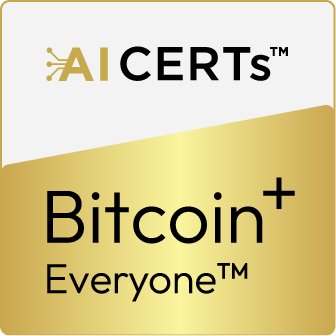"*" indicates required fields
Blockchain+ Developer™
Build the Foundations of Tomorrow with Blockchain DeveloperThe Blockchain+ Developer certification offers a comprehensive journey into blockchain technology and smart contracts. Beginning with the origin and structure of blockchain, participants explore consensus mechanisms and the concept of smart contracts, delving into Ethereum Virtual Machine (EVM) and Solidity basics. Advanced topics cover Solidity structures, tokenization, and non fungible tokens (NFTs). Development tools like Truffle and Ganache are introduced, along with testing techniques and DApp integration. Participants then explore private blockchain with Hyperledger Fabric, learning its architecture, Docker setup, and Golang programming. The course culminates in chaincode development, REST API integration, and chain code auditing.
Buy Exam Bundle Download Blueprint Find a Training Partner Download Executive SummaryKey Benefits
Prerequisites
- Familiarity with general programming concepts like data structures, algorithms and networks
- Understanding of at least one legacy programming stack (e.g. Python, JavaScript, Java or similar)
- Fundamental knowledge to use command line consoles on any operating system
- Ability to understand developer concepts like SDKs, APIs, application development tools etc.
- Experience with building end to end tiered applications
Modules
12
Examination
1
50 MCQs
90 Minutes
Passing Score
70%
Certification Modules
- 1.1 Blockchain Origins
- 1.2 What is Blockchain
- 1.3 Consensus Mechanisms
- 1.4 What are Smart Contracts?
- 1.5 Bitcoin Blockchain
- 2.1 What is an EVM and Ethereum?
- 2.2 Wallets Introduction and Creation
- 2.3 Introduction to Remix Editor with Metamask
- 2.4 Smart Contract Basic Structure
- 2.5 Variables, If/Else, Strings, Loops, Arrays, Test Tokens
- 3.1 Libraries, Interfaces, Modifiers
- 3.2 Structures, Enums, ABI, Calldata, Events, Transfers
- 3.3 Contract to Contract calls
- 3.4 Address and Address payable
- 3.5 Receive and Fallback functions
- 3.6 Upgradeable Contracts
- 3.7 Openzepplin Libraries
- 4.1 Introduction
- 4.2 NFT, NFT Minting, IPFS, Security, Pinata Cloud
- 4.3 IPFS Integration
- 5.1 Truffle, Ganache, Hardhat
- 5.2 Tools
- 5.3 Localnet, and Testnet Deployment
- 6.1 Web3.0 Integration with JS
- 6.2 Wallet Creation, Sending Transactions
- 7.1 Public Vs Private Vs Consortium Blockchain Frameworks
- 7.2 Introduction to Hyperledger Fabric
- 7.3 Hyperledger Projects
- 8.1 Basic Concepts of HLF
- 8.2 Docker Introduction
- 8.3 Commands and Setup
- 8.4 SDK Installation
- 8.5 Docker Configuration
- 9.1 Introduction
- 9.2 VS Code Plugin Setup, Hello World
- 9.3 Basics of the Language
- 9.4 Functions, Structures
- 10.1 Chaincode Explanation using Fabric Samples, Test- network Explanation using Linux Scripting
- 10.2 Error Handling
- 11.1 Extending the Default Chaincode
- 11.2 Chaincode Deployment
- 11.3 REST API Integration with Front End
- 12.1 Why Smart Contract Audits Are Necessary
- 12.2 Introduction to Firefly, Fabconnect, Blockchain Explorer
Certification Modules
- 1.1 Blockchain Origins
- 1.2 What is Blockchain
- 1.3 Consensus Mechanisms
- 1.4 What are Smart Contracts?
- 1.5 Bitcoin Blockchain
- 2.1 What is an EVM and Ethereum?
- 2.2 Wallets Introduction and Creation
- 2.3 Introduction to Remix Editor with Metamask
- 2.4 Smart Contract Basic Structure
- 2.5 Variables, If/Else, Strings, Loops, Arrays, Test Tokens
- 3.1 Libraries, Interfaces, Modifiers
- 3.2 Structures, Enums, ABI, Calldata, Events, Transfers
- 3.3 Contract to Contract calls
- 3.4 Address and Address payable
- 3.5 Receive and Fallback functions
- 3.6 Upgradeable Contracts
- 3.7 Openzepplin Libraries
- 4.1 Introduction
- 4.2 NFT, NFT Minting, IPFS, Security, Pinata Cloud
- 4.3 IPFS Integration
- 5.1 Truffle, Ganache, Hardhat
- 5.2 Tools
- 5.3 Localnet, and Testnet Deployment
- 6.1 Web3.0 Integration with JS
- 6.2 Wallet Creation, Sending Transactions
- 7.1 Public Vs Private Vs Consortium Blockchain Frameworks
- 7.2 Introduction to Hyperledger Fabric
- 7.3 Hyperledger Projects
- 8.1 Basic Concepts of HLF
- 8.2 Docker Introduction
- 8.3 Commands and Setup
- 8.4 SDK Installation
- 8.5 Docker Configuration
- 9.1 Introduction
- 9.2 VS Code Plugin Setup, Hello World
- 9.3 Basics of the Language
- 9.4 Functions, Structures
- 10.1 Chaincode Explanation using Fabric Samples, Test- network Explanation using Linux Scripting
- 10.2 Error Handling
- 11.1 Extending the Default Chaincode
- 11.2 Chaincode Deployment
- 11.3 REST API Integration with Front End
- 12.1 Why Smart Contract Audits Are Necessary
- 12.2 Introduction to Firefly, Fabconnect, Blockchain Explorer
What Will You Learn?
Solidity Programming and Smart Contract Development
Learners will gain proficiency in Solidity, the programming language used for writing smart contracts on the Ethereum blockchain. Starting from basics to advanced concepts, including structures and error handling.
Tokenization and Non-Fungible Tokens (NFTs) Management
Learners will acquire skills in creating and managing digital tokens and non-fungible tokens (NFTs) on blockchain platforms. This involves the tokenization process, including token standards like ERC-20 and ERC-721, and learn how to develop NFT applications for unique asset representation, such as digital art, collectibles, and gaming assets.
Hyperledger Fabric Development
Learners will explore Hyperledger Fabric, a permissioned blockchain framework, and its components like writing chaincode (smart contracts) in Golang. Gain understanding on the structure and error handling mechanisms specific to Hyperledger Fabric chaincode.
Smart Contract Auditing and Testing
Learners will acquire skills in auditing and testing smart contracts to ensure their security, reliability, and compliance with business requirements. This includes learning about tools like Hyperledger Fabconnect and Firefly for smart contract auditing, debugging, and monitoring, enabling them to identify and address vulnerabilities and optimize smart contract performance.
Hear it from the Learners

Marc H
Happy to share I've completed the AI+ Executive Certification from AI CERTs! This program has sharpened my skills in strategic AI application + implementation, further equipping me to lead AI-driven organizational transformation.

Georgia L
As VP Operations, my recent completion of the AI+ Executive exam through AI CERTs was a pivotal step in advancing my AI skill set as we embrace an AI-driven future. This certification not only deepened my understanding of AI's broad impact across various divisions but also equipped me with the tools to make informed, strategic decisions.

Prakash G
I recently completed AI+ Executive course by AI CERTs and it was a fantastic experience! I learned everything from the basics of AI to applying AI in real business situations. It was an eye-opener for me as I could learn things about AI in detail with real examples. Thanks to AI CERTs for making complex concepts easy to understand and apply!

Kunj F
I'm thrilled to share that I have earned the AICT certification from AI CERTs! This immersive experience has not only enriched my understanding of artificial intelligence but has also fueled my passion for cutting-edge technologies shaping the future. I am excited to bring the power of AI into real-world applications and explore the depths of AI for business innovation and strategic solutions.
Discover Your Ideal Role-Based Certifications and Programs!
Not sure which certifications to go for? Take our quick assessment to discover the perfect role-based certifications and programs tailored just for you.


